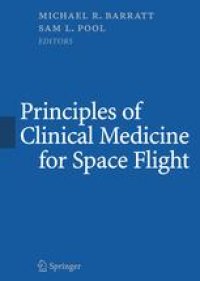
Ebook: Principles of Clinical Medicine for Space Flight
- Tags: General Practice / Family Medicine, Aerospace Technology and Astronautics, Extraterrestrial Physics Space Sciences
- Year: 2008
- Publisher: Springer-Verlag New York
- Edition: 1
- Language: English
- pdf
Advances over the past decades in space flight technology have allowed U.S., Russian, and other space programs to not only increase the frequency of manned space flights but also to increase the duration of these flights. As such, a large body of knowledge has been developed regarding the ways in which space flight affects the health of the personnel involved. Now, for the first time, this body of clinical knowledge on how to diagnose and treat conditions that either develop during a mission or because of a mission has been compiled by Drs. Michael R. Barratt and Sam L. Pool of the NASA/Johnson Space Center. This text is a must have for all those associated with aerospace medicine.
Advances over the past decades in space flight technology have allowed U.S., Russian, and other space programs to not only increase the frequency of manned space flights but also to increase the duration of these flights. As such, a large body of knowledge has been developed regarding the ways in which space flight affects the health of the personnel involved. Now, for the first time, this body of clinical knowledge on how to diagnose and treat conditions that either develop during a mission or because of a mission has been compiled by Drs. Michael R. Barratt and Sam L. Pool of the NASA/Johnson Space Center.
Advances over the past decades in space flight technology have allowed U.S., Russian, and other space programs to not only increase the frequency of manned space flights but also to increase the duration of these flights. As such, a large body of knowledge has been developed regarding the ways in which space flight affects the health of the personnel involved. Now, for the first time, this body of clinical knowledge on how to diagnose and treat conditions that either develop during a mission or because of a mission has been compiled by Drs. Michael R. Barratt and Sam L. Pool of the NASA/Johnson Space Center.
Content:
Front Matter....Pages i-xiv
Physical and Bioenvironmental Aspects of Human Space Flight....Pages 3-26
Human Response to Space Flight....Pages 27-57
Medical Evaluations and Standards....Pages 59-67
Spaceflight Medical Systems....Pages 69-100
Acute Care....Pages 101-122
Surgical Capabilities....Pages 123-137
Medical Evacuation and Vehicles for Transport....Pages 139-161
Telemedicine....Pages 163-179
Medical Imaging....Pages 181-207
Space and Entry Motion Sickness....Pages 211-222
Decompression-Related Disorders: Decompression Sickness, Arterial Gas Embolism, and Ebullism Syndrome....Pages 223-246
Decompression-Related Disorders: Pressurization Systems, Barotrauma, and Altitude Sickness....Pages 247-271
Renal and Genitourinary Concerns....Pages 273-292
Musculoskeletal Response to Space Flight....Pages 293-306
Immunologic Concerns....Pages 307-315
Cardiovascular Disorders....Pages 317-359
Neurologic Concerns....Pages 361-380
Gynecologic and Reproductive Concerns....Pages 381-390
Behavioral Health and Performance Support....Pages 391-412
Fatigue, Sleep, and Chronotherapy....Pages 413-425
Health Effects of Atmospheric Contamination....Pages 427-443
Hypoxia, Hypercarbia, and Atmospheric Control....Pages 445-473
Radiation Disorders....Pages 475-519
Acoustics Issues....Pages 521-533
Ophthalmologic Concerns....Pages 535-544
Dental Concerns....Pages 545-557
Spaceflight Metabolism and Nutritional Support....Pages 559-576
Back Matter....Pages 577-596
Advances over the past decades in space flight technology have allowed U.S., Russian, and other space programs to not only increase the frequency of manned space flights but also to increase the duration of these flights. As such, a large body of knowledge has been developed regarding the ways in which space flight affects the health of the personnel involved. Now, for the first time, this body of clinical knowledge on how to diagnose and treat conditions that either develop during a mission or because of a mission has been compiled by Drs. Michael R. Barratt and Sam L. Pool of the NASA/Johnson Space Center.
Content:
Front Matter....Pages i-xiv
Physical and Bioenvironmental Aspects of Human Space Flight....Pages 3-26
Human Response to Space Flight....Pages 27-57
Medical Evaluations and Standards....Pages 59-67
Spaceflight Medical Systems....Pages 69-100
Acute Care....Pages 101-122
Surgical Capabilities....Pages 123-137
Medical Evacuation and Vehicles for Transport....Pages 139-161
Telemedicine....Pages 163-179
Medical Imaging....Pages 181-207
Space and Entry Motion Sickness....Pages 211-222
Decompression-Related Disorders: Decompression Sickness, Arterial Gas Embolism, and Ebullism Syndrome....Pages 223-246
Decompression-Related Disorders: Pressurization Systems, Barotrauma, and Altitude Sickness....Pages 247-271
Renal and Genitourinary Concerns....Pages 273-292
Musculoskeletal Response to Space Flight....Pages 293-306
Immunologic Concerns....Pages 307-315
Cardiovascular Disorders....Pages 317-359
Neurologic Concerns....Pages 361-380
Gynecologic and Reproductive Concerns....Pages 381-390
Behavioral Health and Performance Support....Pages 391-412
Fatigue, Sleep, and Chronotherapy....Pages 413-425
Health Effects of Atmospheric Contamination....Pages 427-443
Hypoxia, Hypercarbia, and Atmospheric Control....Pages 445-473
Radiation Disorders....Pages 475-519
Acoustics Issues....Pages 521-533
Ophthalmologic Concerns....Pages 535-544
Dental Concerns....Pages 545-557
Spaceflight Metabolism and Nutritional Support....Pages 559-576
Back Matter....Pages 577-596
....